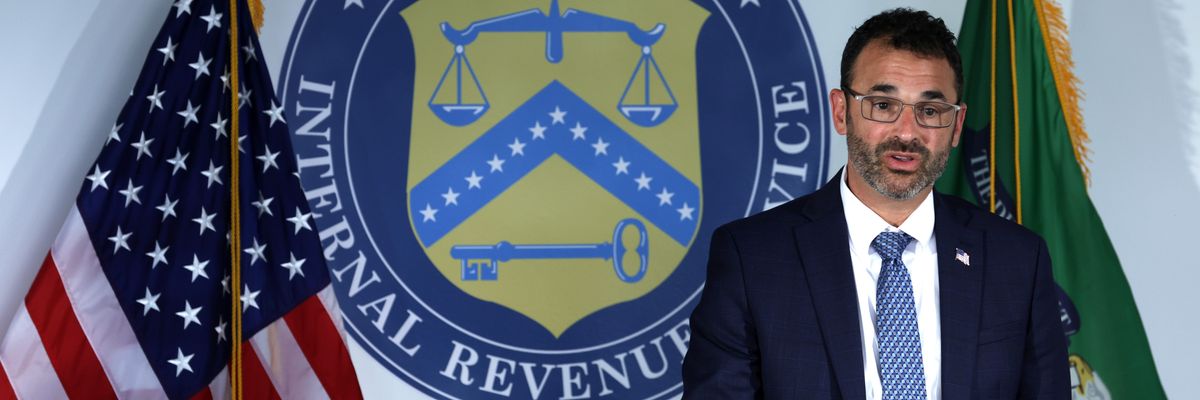The U.S. Internal Revenue Service on Friday won praise from congressional Democrats and progressive groups for announcing "a sweeping, historic effort to restore fairness in tax compliance by shifting more attention onto high-income earners, partnerships, large corporations, and promoters abusing the nation's tax laws."
The IRS effort is enabled by some of the $80 billion in funding for the agency included in the Inflation Reduction Act (IRA), which President Joe Biden signed into law last year. About a quarter of that money is set to be clawed back as part of his recent deal with congressional Republicans to temporarily suspend the nation's debt limit.
The agency intends to contact about 1,600 people with incomes above $1 million and over $250,000 in tax debt, building on an earlier push that collected $38 million from more than 175 high-income earners. It also aims to expand a pilot program targeting large partnerships, with help from artificial intelligence (AI). The IRS plans to launch examinations of 75 partnerships with an average of over $10 billion in assets—including hedge funds, law firms, and real estate investors—this month.
"This new compliance push makes good on the promise of the Inflation Reduction Act to ensure the IRS holds our wealthiest filers accountable to pay the full amount of what they owe," IRS Commissioner Danny Werfel said in a statement. "The years of underfunding that predated the Inflation Reduction Act led to the lowest audit rate of wealthy filers in our history. I am committed to reversing this trend, making sure that new funding will mean more effective compliance efforts on the wealthy, while middle- and low-income filers will continue to see no change in historically low pre-IRA audit rates for years to come."
"The nation relies on the IRS to collect funding for every critical government mission—from keeping our skies safe, our food safe, and our homeland safe. It's critical that the agency addresses fundamental gaps in tax compliance that have grown during the last decade," he added. "There is a sea change taking place at the IRS in every aspect of our operations. Anchored by a deep respect for taxpayer rights, the IRS is deploying new resources towards cutting-edge technology to improve our visibility on where the wealthy shield their income and focus staff attention on the areas of greatest abuse."
The commissioner pledged that "we will increase our compliance efforts on those posing the greatest risk to our nation's tax system, whether it's the wealthy looking to dodge paying their fair share or promoters aggressively peddling abusive schemes. These steps are critical for the future of the nation's tax system."
Americans For Tax Fairness was among the organizations that celebrated the announcement on social media, declaring that "this is what happens when you give the IRS the funding it needs to catch rich tax cheats."
Groundwork Action highlighted that the agency's new moves are "all possible thanks to additional resources from the Inflation Reduction Act," while its sister organization Groundwork Collaborative said, "Just think of what we can accomplish with a fully funded IRS and a tax code that makes corporations and the wealthy pay their fair share."
However, such policies are highly unlikely to pass in the current Congress, with many Republicans who continue to not only oppose IRS funding but also push for tax bills designed to serve rich individuals and companies.
In addition to welcoming the "historic crackdown on rich tax cheats," Congressman Bill Pascrell (D-N.J.) said, "Reminder: every single Republican in Congress voted against this crackdown on big business tax cheats."
Senate Finance Committee Chair Ron Wyden (D-Ore.) similarly praised the IRS while calling out the congressional GOP.
"Today's announcement from the IRS makes clear that wealthy tax cheats are no longer allowed to play by a different set of rules than everyday Americans," he said in a statement. "I'm pleased to see the IRS using the enforcement funding from the Inflation Reduction Act to crack down on large, complex partnerships using groundbreaking technology—this is a big deal and represents a fresh approach to taking on sophisticated tax cheats."
"This action goes to the heart of Democrats' effort to ensure the wealthiest are paying their fair share so Medicare and Social Security can be protected and strengthened, education can be improved, and more investments can be made in priorities Americans are demanding," he added. "This news stands in stark contrast to the approach taken by House Republicans, who want to allow wealthy tax cheats to continue business as usual, paying little to no tax and asking middle-class taxpayers to foot the bill."
The New York Timesreported Friday that "the fight over IRS funding is continuing, as the House and the Senate try to agree on spending legislation to avert a possible government shutdown at the end of the month. Senate Democrats want to hold the base budget of the IRS steady while holding on to some of the Inflation Reduction Act money that lawmakers had agreed to rescind as part of the debt limit deal, while House Republicans are pushing for far deeper cuts that would eat into the tax agency's enforcement budget."
